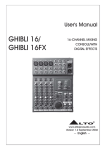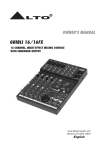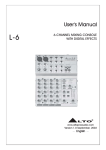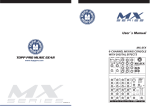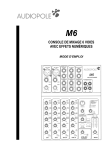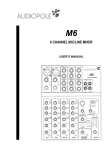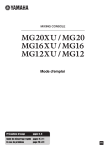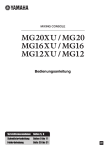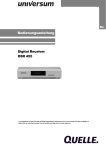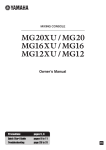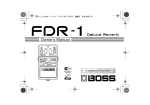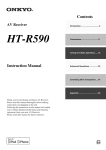Download Alto GHIBLI 16 User`s manual
Transcript
GHIBLI 16/ GHIBLI 16FX User's Manual 16-CHANNEL MIXING CONSOLE/ WITH DIGITAL EFFECTS R LTO www.altoproaudio.com Version 1.0 September 2004 English the recommended fuse type as indicated in this manual. Do not short-circuit the fuse holder. Before replacing the fuse, make sure that the product is OFF and disconnected from the AC outlet. SAFETY RELATED SYMBOLS CAUTION RISK OF ELECTRIC SHOCK DO NOT OPEN Protective Ground Before turning the product ON, make sure that it is connected to Ground. This is to prevent the risk of electric shock. This symbol, wherever used, alerts you to the presence of un-insulated and dangerous voltages within the product enclosure. These are voltages that may be sufficient to constitute the risk of electric shock or death. Never cut internal or external Ground wires. Likewise, never remove Ground wiring from the Protective Ground Terminal. This symbol, wherever used, alerts you to important operating and maintenance instructions. Please read. Protective Ground Terminal AC mains (Alternating Current) Hazardous Live Terminal ON: OFF: Operating Conditions Always install in accordance with the manufacturer's instructions. To avoid the risk of electric shock and damage, do not subject this product to any liquid/rain or moisture. Do not use this product when in close proximity to water. Denotes the product is turned on. Denotes the product is turned off. Do not install this product near any direct heat source. WARNING Do not block areas of ventilation. Failure to do so could result in fire. Describes precautions that should be observed to prevent the possibility of death or injury to the user. Keep product away from naked flames. CAUTION IMPORTANT SAFETY INSTRUCTIONS Describes precautions that should be observed to prevent damage to the product. Read these instructions Follow all instructions Keep these instructions. Do not discard. Heed all warnings. Only use attachments/accessories specified by the manufacturer. WARNING Power Supply Ensure that the mains source voltage (AC outlet) matches the voltage rating of the product. Failure to do so could result in damage to the product and possibly the user. Power Cord and Plug Do not tamper with the power cord or plug. These are designed for your safety. Do not remove Ground connections! If the plug does not fit your AC outlet seek advice from a qualified electrician. Protect the power cord and plug from any physical stress to avoid risk of electric shock. Do not place heavy objects on the power cord. This could cause electric shock or fire. Unplug the product before electrical storms occur and when unused for long periods of time to reduce the risk of electric shock or fire. External Connection Always use proper ready-made insulated mains cabling (power cord). Failure to do so could result in shock/death or fire. If in doubt, seek advice from a registered electrician. Cleaning Do Not Remove Any Covers When required, either blow off dust from the product or use a dry cloth. Do not use any solvents such as Benzol or Alcohol. For safety, keep product clean and free from dust. Within the product are areas where high voltages may present. To reduce the risk of electric shock do not remove any covers unless the AC mains power cord is removed. Servicing Covers should be removed by qualified service personnel only. Refer all servicing to qualified service personnel only. Do not perform any servicing other than those instructions contained within the User's Manual. No user serviceable parts inside. Fuse To prevent fire and damage to the product, use only 1 TABLE OF CONTENTS 1. INTRODUCTION...........................................................................................................................................3 2. FEATURES...................................................................................................................................................3 3. READY TO START.......................................................................................................................................3 4. CONTROL ELEMENTS...............................................................................................................................4 5. INSTALLATION AND CONNECTION........................................................................................................10 6. PRESET LIST.............................................................................................................................................13 7. SYSTEM BLOCK DIAGRAMS...................................................................................................................14 8. TECHNICAL SPECIFICATION...................................................................................................................16 9. WARRANTY................................................................................................................................................17 2 1. INTRODUCTION Thank you very much for expressing your confidence in LTO products by purchasing GHIBLI 16(FX) 16-Channel Mixing Console. You will get the smooth, accurate more natural and open sound from this apparatus, and it is really ideal for small gigs, recording and fixed PA installations. The GHIBLI 16(FX) is packed with features that can not be found in other con soles of its size: 4 mono (these are provided with ultra low noise microphone preamplifiers and Phantom Power at +18 Volt) and 4 stereo input channels, and each mono channel with 3 bands EQ + Mid Frequency sweep and MUTE function; highly accurate 4-segment bar graph meters; built-in high efficiency digital effects processor for GHIBLI 16FX only; Your GHIBLI 16(FX) is very easy to operate but we advise you to go through each section of this manual carefully. In this way you will get the best out of your GHIBLI 16(FX). 2. FEATURES The GHIBLI 16(FX) 16-Channel Mixing Console is designed for professional application. It provides the following features: Mono channels with 3 bands EQ + Mid Frequency sweep and MUTE function. TUBE SOUND COMPRESSOR on the MIC1-4 channels + De-esser function. Insert function for all mono channels. Surround processor with center and surround out + Stereo Bass Enhancer. Extremely high headroom offering more dynamic range Balanced ultra low noise microphone inputs with "HIGH END PREAMP" Suitable for live, studio and home applications 2 AUX Control per mono channel for internal/external effects and monitoring High-quality, low tolerance components for highest results. Rugged construction ensures long life and durability External power supply design for professional applications. 3. READY TO START 3.1 There is a small black box provided with your GHIBLI 16(FX). This is the specific 18V AC input adapter. Connect the proper terminal into your GHIBLI 16(FX) and the adapter into an AC socket. 3.2 Be sure that the main power switch is turned off before connecting the mixer to the AC socket. Also, You should make sure that all input and output controls are turned down before connecting the AC adapter. This will avoid damage to your speakers and avoid excessive noise. 3.3 You shall turn on the mixer BEFORE the power amplifier and turn the mixer off AFTER the power amplifier once you have finished your working session. 3.4 Before disconnecting the GHIBLI 16(FX) always turn off the power switch. 3.5 Do not use solvents to clean your GHIBLI 16(FX). A dry and clean cloth will be OK. 3 4. CONTROL ELEMENTS GHIBLI 16 MIC 1 MIC 3 MIC 2 MIC 4 R LTO GHIBLI 16 16-CHANNEL MIXING CONSOLE 2 1 2 1 2 1 2 CENTER & CH5 LEFT IN (MONO) CH7 LEFT IN (MONO) SURROUND OUT 1 3 3 3 3 MIC IN (BAL) MIC IN (BAL) MIC IN (BAL) MIC IN (BAL) CH6 RIGHT IN CH8 RIGHT IN AUX1 OUT LINE IN (UNBAL) LINE IN (UNBAL) LINE IN (UNBAL) LINE IN (UNBAL) CH9-10 IN (LEFT) CH13-14 IN (LEFT) AUX2 OUT INSERT INSERT INSERT INSERT CH12-11 IN (RIGHT) CH16-15 IN (RIGHT) PHONES LOW CUT HARD 100Hz OFF LOW CUT HARD 100Hz OFF LOW CUT HARD 100Hz OFF SOFT SOFT SOFT BYPASS COMP DE-ES BYPASS COMP DE-ES BYPASS COMP DE-ES CLIP MIC 0 LINE -20 50 0dB +30 0dB 15KHz HIGH -15 +15 0dB -15 50 0dB +30 0dB 15KHz -15 +15 +15 +15 freq Hz HIGH +15 0dB MID -15 +15 -15 1KHz MID 50 0dB +30 0dB 15KHz -15 0dB MID 1KHz MID CLIP MIC 0 LINE -20 HIGH -15 0dB -15 +15 50 0dB +30 0dB 15KHz MID +15 1KHz MID freq Hz RIGHT OUT GAIN CLIP MIC 0 LINE -20 HIGH MID 1KHz GAIN CLIP MIC 0 LINE -20 BALANCED +4dBu LOW CUT SOFT GAIN LEFT OUT HARD 100Hz OFF BYPASS COMP DE-ES GAIN BALANCED +4dBu MID freq Hz freq Hz OPERATING BASS ENHANCER LOW 80Hz LOW 80Hz 80Hz BYPASS ON - - +10 AUX2 post - +10 center PAN 0dB PAN 8 -20 AUX2 post +10 center -10 0 10 0dB +10 1 - - +10 2 CH ON MUTE LEVEL 0dB - +10 3 Left +10 0dB - MUTE LEVEL - - MAIN MIX LEVEL 4 - LEVEL +10 0dB AUX1 pre - +10 0dB +10 4 0dB 7-8 Right CH ON PAN Right Left LEVEL 5-6 PAN 8 MUTE LEVEL 0dB Right +10 center RIGHT 8 8 - CH ON Left 8 MUTE LEVEL 0dB Right 8 CH ON Left 8 Right PAN Right Left 0dB Left - +10 center AUX1 pre LEFT +10 8 8 0dB AUX1 pre +10 PHONES 8 8 AUX1 pre - - +15 0dB +10 AUX2 post center PAN - -15 8 - +10 center AUX1 pre 0dB AUX2 post +15 0dB +10 8 - -15 8 AUX1 pre 0dB - +15 0dB +10 8 - -15 +15 0dB 8 -15 0dB AUX1 pre 0dB 8 80Hz 0dB 0dB 8 LOW 5K 600 0dB 0dB LEVEL +10 9-12 - AUX1 pre +10 8 LOW 5K 600 0dB 8 5K 600 0dB 8 5K 600 LEVEL +10 13-16 GHIBLI 16FX MIC 1 MIC 3 MIC 2 MIC 4 R LTO GHIBLI 16 FX 16-CHANNEL MIXING CONSOLE 2 1 2 1 2 1 2 1 3 3 3 3 MIC IN (BAL) MIC IN (BAL) MIC IN (BAL) MIC IN (BAL) CH6 RIGHT IN CH8 RIGHT IN LINE IN (UNBAL) LINE IN (UNBAL) LINE IN (UNBAL) CH9-10 IN (LEFT) CH13-14 IN (LEFT) AUX2 OUT INSERT INSERT INSERT INSERT CH12-11 IN (RIGHT) CH16-15 IN (RIGHT) PHONES LOW CUT HARD 100Hz LOW CUT HARD 100Hz OFF LOW CUT HARD 100Hz OFF SOFT SOFT SOFT BYPASS COMP DE-ES BYPASS COMP DE-ES BYPASS COMP DE-ES GAIN GAIN GAIN GAIN CLIP CLIP CLIP CLIP MIC 0 LINE -20 HIGH 50 0dB +30 0dB 15KHz MIC 0 LINE -20 HIGH 50 0dB +30 0dB 15KHz LEFT OUT BALANCED +4dBu RIGHT OUT LOW CUT SOFT 50 0dB +30 0dB 15KHz BALANCED +4dBu HARD 100Hz OFF BYPASS COMP DE-ES MIC 0 LINE -20 DIGITAL EFFECTS AUX1 OUT LINE IN (UNBAL) OFF WITH CENTER & CH5 LEFT IN (MONO) CH7 LEFT IN (MONO) SURROUND OUT MIC 0 LINE -20 HIGH 15 14 13 12 11 50 0dB +30 0dB 15KHz 16 1 2 4 5 6 10 9 8 PRESETS VIBRAFLANGE FUNKY ROCKABILLY BIGSTAGE VIBRATO 1 2 3 4 5 8 9 12 13 16 3 7 FLANGER CHORUS HIGH PEAK 0dB -15 +15 0dB MID +15 1KHz -15 +15 0dB +15 -15 1KHz MID +15 MID -15 1KHz freq Hz -15 0dB MID -15 MID +15 +10 REVERB LEVEL +10 FX LEVEL +15 1KHz MID freq Hz - MID 8 -15 +15 8 -15 MID freq Hz freq Hz OPERATING BASS ENHANCER LOW LOW 80Hz 0dB 0dB LOW 80Hz 80Hz BYPASS ON - AUX2 post D F center PAN - AUX1 pre 8 +10 AUX2 post D F -20 AUX2 post -10 0 10 Right Left 0dB - +10 center PAN PAN +10 center +10 1 - - +10 2 Right 0dB +10 Right CH ON MUTE LEVEL 0dB - +10 3 Left LEVEL 0dB - MUTE LEVEL - - +10 4 5 MAIN MIX LEVEL 0dB AUX1 pre - +10 0dB +10 7-8 Right CH ON - 5-6 PAN 8 MUTE LEVEL 0dB PAN RIGHT 8 8 - CH ON Left 8 MUTE LEVEL 0dB Right 8 CH ON Left 8 Right +10 center Left LEVEL 0dB Left PAN LEFT +10 0dB - +10 center PHONES X - +10 8 8 center 0dB X - +10 0dB AUX1 pre +10 - +15 AUX1 pre 8 0dB X - - +10 AUX2 post D F D F X 0dB AUX1 pre -15 8 0dB +15 8 - -15 8 0dB AUX1 pre +10 8 - +15 8 0dB -15 8 +15 8 -15 0dB AUX1 pre 0dB 0dB LEVEL +10 9-12 - AUX1 pre +10 8 80Hz 5K 600 0dB 8 LOW 5K 600 0dB 8 5K 600 0dB 8 5K 600 LEVEL +10 13-16 4.1 THE MIC/LINE INPUT 1 These are Channel 1 through Channel 4. You can connect balanced, low impedance microphones or a low level signal to the XLR socket. On the 1/4" Line jack you can connect either a microphone or a line level instrument . Note: You shall never connect an unbalanced microphone to the XLR socket if you do not want to damage both the microphone and the mixer. Also, it is not possible to simultaneously use both the MIC&LINE inputs on the same channel, use only one of them for the appropriate source on each channel. MIC 1 2 1 MIC IN (BAL) - PHANTOM POWER +18 Volts It is available only on the XLR input sockets. Please make sure the power switch is turned off before connecting a microphone to the XLR input. 4.2 MONO CHANNEL INSERT LINE IN (UNBAL) 2 2 Insert points are provided for mono MIC channels, which can allow you to patch external signal processing devices into signal path. When you insert a TRS jack in the insert socket, the signal will be taken out after the channel compressor, sent to an external processor, and returned into the channel strip immediately before the EQ section. Of course, the jacks used must be stereo (Tip Send/Ring Return). 4.3 STEREO INPUT (CH5~CH16) INSERT 3 Each stereo channel comes with two unbalanced line level inputs on 1/4" TRS jacks, which are used to connect left and right input signals. Use the LEFT input when connect a mono input signal to the STEREO INPUT. The last two stereo channels feature an original and exclusive double stereo input for each stereo channel. This feature allows you to connect two stereo sources at the same time for each stereo channel, enlarging the real number of signals you can manage at the same time. 4.4 LOW CUT 1 3 4 By pushing this switch you will activate a 100Hz low frequency filter that provides a precise cut for frequencies under 100Hz. You can use this facility to reduce the hum noise infected by the mains power supply, or the stage rumble while using a microphone. 4.5 THE TUBE SOUND COMPRESSOR SWITCH 5 The TSC switch (on the first 4 channels) activates the TUBE SOUND COMPRESSOR and let you choose between Compressor and De-esser functions. The two yellow LEDs show the amount of compression applied to the input signal. Two algorithms are provided, one for soft compression with a threshold level of 0dB, and one for hard limiting with a threshold level of around +10dB. This dynamic processor works on the very entry stage of the channel and it can avoid also the channel clipping, maintain the best signal-to-noise ratio. The compression algorithm applied to the sound is shown by two yellow LEDs. 6 CH5 LEFT IN (MONO) CH7 LEFT IN (MONO) CH6 RIGHT IN CH8 RIGHT IN CH9-10 IN (LEFT) CH13-14 IN (LEFT) CH12-11 IN (RIGHT) CH16-15 IN (RIGHT) 3 6 4.6 CLIP LED/0dB LED The green LED illuminates when the signal overpasses the 0dB level, the red CLIP LED illuminates when the channel is going into overload. If the CLIP LED becomes permanently on, reduce the amount of gain. To have best signal-to-noise ratio set the gain so that the green 0dB LED becomes lighted. 7 4.7 INPUT LEVEL SETTING LOW CUT This control is provided with 2 different indication rings: one is for the MIC input and the other for the LINE input. When you use a MIC input you shall read the INSIDE ring (0~50dB); when you use a LINE input you shall read the OUTSIDE ring (-20~+30dB). 100Hz OFF SOFT GAIN CLIP MIC 0 LINE -20 50 0dB +30 0dB HIGH 15KHz -15 MID 9 -15 +15 1KHz MID freq Hz - LOW 11 This is the bass control. It is used to boost male voice, kickdrum or bass guitar. Your system will sound much bigger than what it is. The gain range goes from -15dB to +15dB and the center frequency is 80Hz. LOW 80Hz 11 -15 +15 0dB +10 8 - AUX1 pre 0dB D F X +10 8 - 12 AUX2 post center PAN 13 13 14 Left 15 This control will adjust the overall level of this channel and set the amount of signal sent to the Main output, and to the Surround and Center outputs. 7 MUTE LEVEL 0dB 14 15 - Mono channels are provided with a MUTE switch that allows to switch on and off the channel signal, both on Left and Right buses and on AUX ones. Right CH ON 8 This is the PANORAMA control. You can adjust the stereo image of the signal via this control. Keep this control in center position and your signal will be positioned in the middle of stage. Turn this control fully counterclockwise and the signal will be present only on the left speaker and viceversa. Of course a wide number of intermediate positions are available. 4.12 LEVEL 10 5K 600 0dB 4.11 MUTE SWITCH 7 +15 0dB - MID FREQUENCY SWEEP 10 This control allow to choose the ceuter frequency of the mid band in a range going from 600Hz to 5KHz. 4.10 PAN 6 8 - MID 9 This is the midrange control. It can affect most fundamental frequencies of all musical instruments and human voice. An attentive use of this control will give you a very wide panorama of sound effects. The gain range goes from -15dB to +15dB. 4.9 AUX 1& 2 12 This control is used to adjust the level of respective channel signal sent to the Auxiliary Bus. The configuration of AUX1 is pre-fader so the signal sent to the AUX Bus 1 will not be affected by the LEVEL control of that particular channel. The AUX2 is post-fader so the signal sent to AUX Bus 2 will be affected by the channel LEVEL control. In this GHIBLI 16FX, The AUX2 signal also feeds the internal digital effect processor. 5 BYPASS COMP DE-ES 4.8 The 3 BANDS EQUALISER - HI 8 This is the treble control. You can use it to get rid of high frequency noises or to boost the sound of cymbals or the high harmonics of the human voice. The gain range goes from -15dB to +15dB with a center frequency of 15kHz. 4 HARD +10 1 4.13 AUX1 pre 16 - 4.14 PAN 8 0dB 17 0dB AUX1 pre - +10 center 8 The AUX1 control allows to manage the signals coming from the stereo inputs and send them to AUX1 output in order to feed the monitors. The level of this signal is not affected by the channel LEVEL control. PAN AUX1 pre +10 center 16 PAN 17 This control allows to choose the position of a mono input signal into the stereo field. It allows also to modify the amount of left and right level for a stereo input signal (balance function). Right Left 0dB Right Left 0dB LEVEL LEVEL 18 - 5-6 0dB 0dB The AUX1 control allows to manage the signals coming from the stereo inputs and send them to AUX1 output in order to feed the monitors. The level of this signal is not affected by the channel LEVEL control. 4.17 LEVEL 0dB AUX1 pre - +10 8 19 - +10 7-8 0dB LEVEL AUX1 pre 19 +10 8 It determines the amount of the input signal on the main mix (LEFT and RIGHT output) and on the Surround and Center outputs. LEVEL 20 - +10 8 - +10 8 4.16 AUX1 pre - +10 8 18 8 4.15 LEVEL 13-16 9-12 20 It is channel's LEVEL control and it determines the amount of the input signals on the main mix (LEFT and RIGHT output) and on the Surround and Center outputs. 4.18 24 BIT DIGITAL EFFECTS (For GHIBLI 16FX Model only) - PRESETS 21 Adjust this knob to select the right effect you wish to perform. There are total 16 options for you: Vibraflange, Funky, Rockabilly, Bigstage, Vibrato, Flanger and Chorus etc. - FX LEVEL CONTROL 22 This control is used to adjust the output level of FX signal, which can be varied from - to 10dB. - REVERB LEVEL CONTROL 23 This control is used to adjust the output level of REVERB signal, which can be varied form - to 10dB. - PEAK LED 24 This LED will illuminate when the internal effect signal is too high and possibly distorted. In case of the digital effect module being muted, this LED also lights up. 21 15 14 13 12 11 16 1 2 3 4 5 6 10 9 8 PRESETS 7 1 2 3 4 5 8 9 12 13 16 VIBRAFLANGE FUNKY ROCKABILLY BIGSTAGE VIBRATO FLANGER CHORUS 22 +10 FX LEVEL +10 REVERB LEVEL 8 8 PEAK - 24 8 24 25 4.19 OPERATING LED The operating LED, when is on, shows that the main power supply is present and the mixer is operating. 25 OPERATING BASS ENHANCER 26 28 0dB BYPASS This control sets the amount of signal sent to the PHONES output. - ON 26 +10 8 4.20 PHONES PHONES 27 4.21 VU METER LEFT -20 It is the output VU meter of the mixer, it shows both the left and right output signal level. -10 0 27 10 RIGHT 28 4.22 BASS ENHANCER This is the BASS ENHANCER processor switch. Inserting this processor it is possible to increase and optimize the general performance at low frequency of the mixer. 29 29 4.23 MAIN MIX LEVEL This control sets the amount of signal sent to the MAIN MIX LEFT and RIGHT outputs. MAIN MIX LEVEL 4.24 CENTER & SURROUND OUT 30 This is Center and Surround output of the mixer. You can pick up their signals using an insert cable. 31 4.25 AUX1 OUT This is the AUX1 output, it is useful to connect active monitors to the mixer. 30 32 4.26 AUX2 OUT GHIBLI 16 FX 16-CHANNEL MIXING CONSOLE This is the AUX2 output, using its signal it is possible to feed an external effect processors, wiring the effect return to one of the stereo channels of the mixer. 4.27 PHONES R LTO WITH CENTER & SURROUND OUT DIGITAL EFFECTS 31 AUX1 OUT 33 This socket will be used to send the signal to a pair of headphones as well as active monitors. 32 BALANCED +4dBu LEFT OUT BALANCED +4dBu RIGHT OUT AUX2 OUT 4.28 MAIN MIX OUTPUT 34 This stereo output is controlled by the MAIN MIX LEVEL on the front panel and will send the audio signal to an external amplifier. It is electronically balanced and it has got a professional standard level of +4dBu. You can use both for stereo and for surround system wiring. 33 PHONES 4.29 REAR PANEL - POWER SUPPLY 35 Used to connect the supplied 18V AC adapter, supplied by LTO company only. - POWER ON/OFF SWITCH 36 This switch is used to turn the main power ON and OFF. 36 35 MODEL SERIAL POWER POWER ON SUPPLY 9 34 5. INSTALLATION AND CONNECTION Ok, you have got to this point and you are now in the position to successfully operate your GHIBLI 16(FX). However, we advise you to read carefully the following section to be the real master of your own mixer. Not paying enough attention to the input signal level, to the routing of the signal and the assignment of the signal will result in unwanted distortion, a corrupted signal or no sound at all. So you should follow these procedures for every single channel: 1). Before connecting mics or instruments, make sure that the power of all your systems components including the mixer is turned off. Also, make sure that all input and output controls of your mixer are turned down. This will avoid damage to your speakers and avoid excessive noise. 2). Properly connect all external devices such as microphone, power amplifier, speakers etc. 3). Connect the 18V AC adapter to the mixer and main power. 4). Now, turn on the power of any perpheral devices, and then power up the mixer. Note: the power amplifier or powered monitors shall be turned on after the mixer and turned off before the mixer. 5). Set the output level of your GHIBLI 16(FX) or the connected power amplifier at no more than 75%. 6). Now, set the PHONE level at no more than 50%. 7). Set HI, MID and LOW EQ controls on the middle position 8). Set panoramic controls on the middle position. 9). While speaking into the mic (or playing the instrument), adjust the channel level control so to maintain a good headroom and ideal dynamic range. 10). You can shape the tone of each channel by adjusting the equalizer controls as desired. 11). Now repeat the same sequence for all other input channels. The Main LED Meter could move up into the red section. In this case you can adjust the overall output level through the MAIN MIX control. 12). For GHIBLI 16FX, you can select desired DSP sound effects via PRESET and FX & REVERB LEVEL controls. 10 5.1 SOME FINAL TIPS ON WIRING CONFIGURATION You can connect unbalanced equipment to balanced inputs and outputs. Simply follow these schemes. Ring=Right Signal Tip Sleeve Ring Strain Clamp Tip=Left Signal Sleeve=Ground/Screen Use for Headphone 1/4" Stereo (TRS) Jack Plug Sleeve Tip Tip=Signal Strain Clamp Sleeve=Ground/Screen Use for Mono Line In, Mono 1/4"Jack Plugs 1/4" Mono (TS) Jack Plug Sleeve Ring=Return Signal Tip Ring Strain Clamp Tip=Send Signal Sleeve=Ground/Screen Use for Insert Points 1/4" Stereo (TRS) Jack Plug 2=Hot(+) 2 1 3 2=Hot(+) 1=Ground/Screen 3=Cold(-) 2 1 3 1=Ground/Screen 3=Cold(-) Use for Balanced Mic Inputs (For unbalanced use, connect pin 1 to 3) Use for Main output (For unbalanced use, leave pin 3 unconnected) 3-pin XLR Male Plug 3-pin XLR Line Socket (seen from soldering side) (seen from soldering side) 11 Ring=Return Signal (Connected together) To Channel Insert Sleeve=Ground/Screen Tip=Signal To Tape or FX Input Sleeve=Ground/Screen 'Tapped' Connection Direct Output Lead (Enables the Insert to be used as a Direct Output while maintaining the channel signal flow) To Processor Input Sleeve=Ground/Screen Tip=Send Signal Tip To Channel Insert Sleeve Ring=Return Signal Ring To Processor Output -Stereo lead for insert Connection (To be used when the processor does not employ a single jack connection for the In/Out Connections) 12 6. PRESET LIST FOR GHIBLI 16FX Position Name Eff.1 Variat (REVERB) Eff.2 Variat (FX) 1 Vibraflange Spring Rev. Waves 2 Funky Spring Rev. Funky style 3 Rockabilly Tape Rev. Slow & Soft Flanger 4 Bigstage Hall Rev. Solo Flanging 5 Vibrato4 Base Rev. Vibrato modul. Speed 4 6 Vibrato3 Base Rev. Vibrato modul. Speed 3 7 Vibrato2 Base Rev. Vibrato modul. Speed 2 8 Vibrato1 Base Rev. Vibrato modul. Speed 1 9 Flanger4 Base Rev. Flanger modul. Speed 3 + mod. Depth + Feedbk 10 Flanger3 Base Rev. Flanger modul. Speed 4 + mod. Depth + Feedbk 11 Flanger2 Base Rev. Flanger modul. Speed 2 12 Flanger1 Base Rev. Flanger modul. Speed 1 13 Chorus4 Base Rev. Chorus modul. Speed 4 14 Chorus3 Base Rev. Chorus modul. Speed 3 15 Chorus2 Base Rev. Chorus modul. Speed 2 + mod. Depth 16 Chorus1 Base Rev. Chorus modul. Speed 1 13 14 A B C D 2 3 1 1 CH11/CH15 (RIGHT) CH12/CH16 ( LEFT) CH10/CH14 (RIGHT) CH9/CH13 (LEFT) CH6/CH8(RIGHT) CH5/CH7(MONO) X2 X1 MIC GAIN: 0~50dB LINEGAIN: +30dB~-20dB LINE IN MIC IN PHANTOM POWER +18V 1a 2b 4d 3c 5e 1a 2b 4d 3c 5e 1a 2b 4d 3c 5e 1a 2b 4d 3c 5e MONO INPUT CHANNELS(1-4) 1 2 2 LOW CUT 100HZ LOW CUTSW LOW CUT SW LOW CUT 100HZ GAIN 4 5 LEVEL AUX1PRE 3 INSERT T R RN TN R BUS L BUS AUX1PRE PAN 5e S 3c 4d 2b 1a SOFTDE-ES COMP BYPASS R BUS L BUS MID (FREQ) HI +/-15db 4 80 600Hz-5KHz 15K 3-BAND EQ LO MUTE PRE AUX1 POST AUX2 LEVEL 5 PAN GHIBLI 16 BLOCK DIAGRAM 3 AUX-2 6 MASTER LEVEL MASTER LEVEL 6 LEFT-BUS BASS ENAHANCER BASS ENAHANCER GR -10dB RED 10dB GR PHONES LEVEL PHONES LEVEL 7 -10dB D9 RED 10dB D7 D9 D7 7 D8 D6 D8 D6 0dB GR -20dB YEL 0dB GR -20dB YEL 8 AUX2(POST) AUX1(PRE) HEADPHONE OUTPUT CENTER&SURROUNDOUT MAIN RIGHT OUTPUT 2 3 1 MAIN LEFT OUTPUT 2 3 1 8 A B C D 7. SYSTEM BLOCK DIAGRAMS GHIBLI 16 AUX-1 RIGHT-BUS 15 A B C D 2 3 1 1 CH11/CH15 (RIGHT) CH12/CH16 ( LEFT) CH10/CH14 (RIGHT) CH9/CH13 ( LEFT) CH6/CH8( RIGHT) CH5/CH7(MONO) X2 X1 MIC GAIN:0~50dB LINE GAIN:+30dB~-20dB LINE IN MIC IN PHANTOM POWER +18V 1a 2b 4d 3c 5e 1a 2b 4d 3c 5e 1a 2b 4d 3c 5e 1a 2b 4d 3c 5e MONO INPUT CHANNELS ( 1-4) 1 2 2 LOW CUT 100HZ LOW CUT SW LOW CUT SW LOW CUT 100HZ 4 5 GAIN LEVEL AUX1 PRE 3 INSERT T R RN TN R BUS L BUS R BUS L BUS AUX1 PRE PAN 5e S 3c 4d 2b 1a SOFT DE-ES COMP BYPASS MID (FREQ) HI +/-15db 4 80 600Hz-5KHz 15K 3-BAND EQ LO MUTE PRE AUX1 POST AUX2 LEVEL 5 PAN GHIBLI 16FX BLOCK DIAGRAM 3 AUX-2 AUX-1 6 REVERB LEVEL FX LEVEL PRESETS MASTER LEVEL MASTER LEVEL 6 RIGHT-BUS LEFT-BUS D9 D7 PHONES LEVEL 7 GR -10dB RED 10dB D8 D6 D8 GR -10dB D9 RED 10dB PHONES LEVEL DSP BOARD BASS ENAHANCER BASS ENAHANCER D6 D7 7 YEL 0dB GR -20dB GR -20dB YEL 0dB AUX2(POST) AUX1(PRE) 8 HEADPHONE OUTPUT CENTER & SURROUND OUT MAIN RIGHT OUTPUT 2 3 1 MAIN LEFT OUTPUT 2 3 1 8 A B C D GHIBLI 16FX 8. TECHNICAL SPECIFICATION Mono input channels Microphone input electronically balanced Bandwidth Distortion (THD & N) 15Hz to 20kHz, +/3dB Gain range SNR (Signal to Noise Ratio) Line input Stereo input channels Bandwidth Distortion (THD & N) Line level range Max input level Line input Equalization unbalanced 15Hz to 60kHz, +/3dB 0.007% at +4dBu, 1kHz, Bandwidth 60KHz -20dBu to +30dBu +10dBu Bandwidth Distortion (THD & N) unbalanced 10Hz to 55kHz, +/3dB 0.007% at +4dBu, 1kHz, Bandwidth 80KHz Hi shelving + 15dB @12kHz + 15dB @600~5kHz Mid bell Low shelving Max output Main Mix Section AUX Sends max out Phones Out Center, Surround output Signal-to-Noise Ratio Power Supply (AC/AC Adapter) Main voltage Physical 0.007% at +4dBu, 1kHz, Bandwidth 20KHz 0dB to 50dB (MIC) Dimension (W D H) Net weight Shipping weight 16 + 15dB @80Hz +26dBu balanced +22dBu unbalanced +22dBu unbalanced +22dBu unbalanced 112dB, all channels at Unity Gain USA/Canada ~115VAC, 60Hz; Europe ~230VAC, 50Hz; U.K./Australia ~240VAC, 50Hz Japan ~100VAC, 60Hz 270mm 198mm 43mm 1.73Kg 2.45Kg SEKAKU ELECTRON INDUSTRY (H.K.) CO. LTD. No.1, Lane 17, Sec. 2, Han Shi West Road, Taichung, 401 TAIWAN http://www.altoproaudio.com Tel:886-4-22313737 email: [email protected] Fax:886-4-22346757 All rights reserved to ALTO. All features and content might be changed without prior notice. Any photocopy, translation, or reproduction of part of this manual without written permission is forbidden. Copyright c 2004 Sekaku Electron NF01889-1.0


















